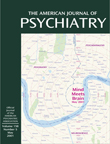To the Editor: In a recent Clinical Case Conference, Dilip V. Jeste, M.D., et al.
(1) presented an interesting comparison between a patient with a late-onset psychotic episode and Sir Isaac Newton’s psychosis. In describing the latter, the authors made several claims and assumptions that we would like to review.
It is well known that soon after his youthful creative years (1664–1666) Newton developed an interest in alchemy, and he performed his first documented experiment in 1678
(2). He handled many heavy metals, including mercury, meticulously recording their properties and, in particular, their taste. Of the 108 entries on taste, a typical one
(3) reads, “strong, sourish, ungrateful,” referring to mercury. Besides mercury, there is evidence in Newton’s journals of exposure to lead, arsenic, and gold—all of which can cause psychiatric symptoms. On the basis of arguments presented by Christianson
(4), Jeste et al. argued against mercury poisoning as a possible cause of Newton’s illness, since symptoms such as tremor and gum ulceration seem to be absent. However, we have no documentary evidence that these symptoms were indeed absent. Moreover, it is known that mercury and other heavy metal poisoning can present a constellation of symptoms, with no specific symptoms being diagnostic for poisoning
(5), which further weakens the argument. At any rate, one cannot ignore the fact that Newton not only was exposed to mercury but actually ingested it by his own account.
It is well documented that Newton experienced an 18-month period (1692–1693) of psychosis. However, the assertion in the article that there was a lack of previous symptoms and that Newton had a total remission of symptoms after that period is questionable. Descriptions of Newton’s groundless suspicious fears are abundant both before and after his psychotic episode
(2). Long before his infamous dispute with Leibniz (1699–1722) on the priority of the invention of calculus, he was embroiled in several similar affairs
(6). The dispute with Leibniz took place after the psychosis developed, and Newton persisted in it, viciously manipulating people even after Leibniz’s death.
No one can deny Newton’s genius, of which he was acutely aware. However, it is important to realize that Newton’s great contributions date back to an amazingly short period, when he conceived most of his mathematical and physical ideas. Although Newton went on to become master of the Mint and president of the Royal Society, he never again resumed serious scientific research and spent his mature years in pseudoreligious pursuits, such as the determination of the exact shape of Solomon’s temple. One can then hardly claim that Newton experienced a “total remission” of symptoms and “returned to…premorbid level…of functioning”
(1, p. 448).

